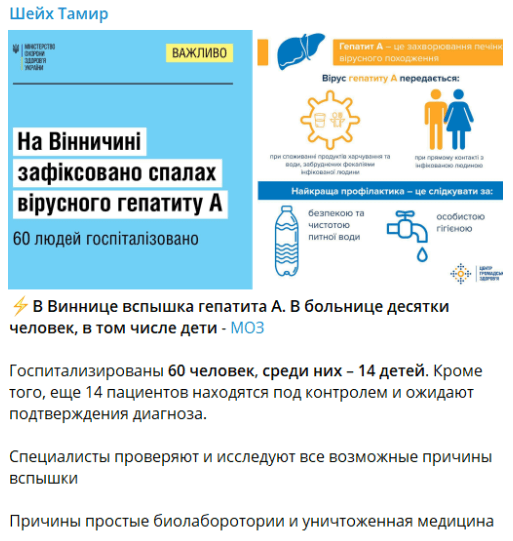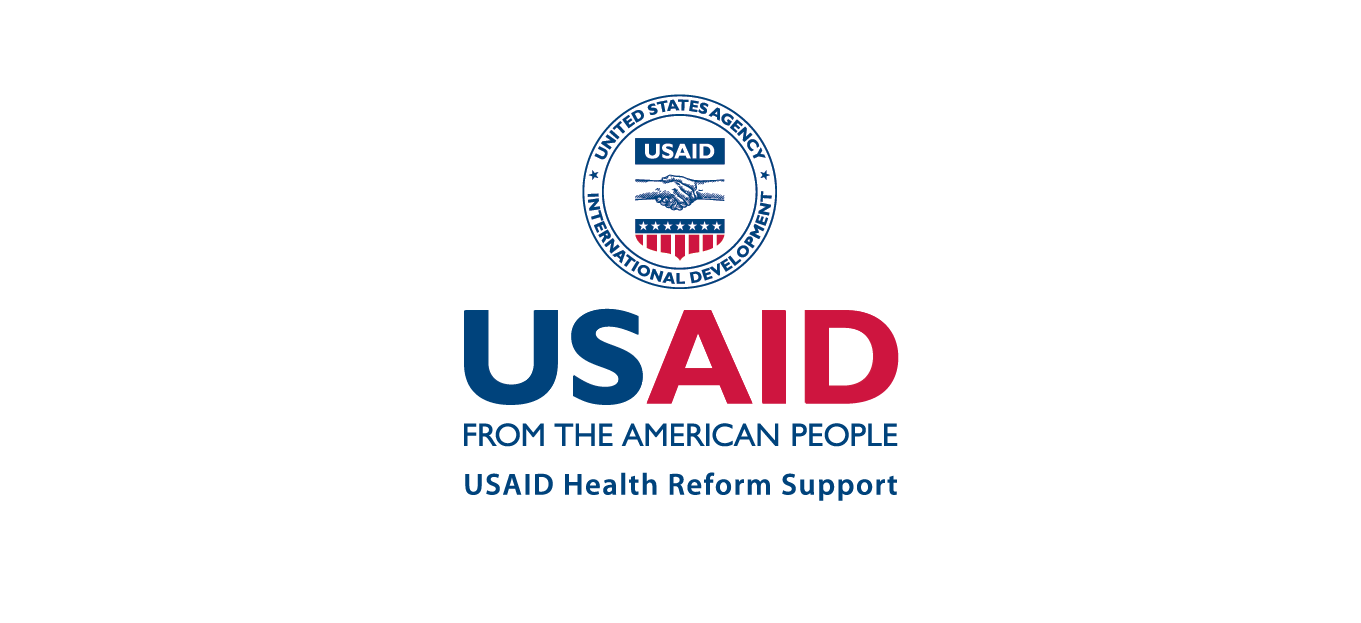In Vinnytsia, at the end of October, an outbreak of hepatitis A was recorded, and the possible causes of the outbreak are currently under investigation. Propagandists have used this news to once again remind about the alleged poor state of Ukrainian healthcare and inadequate working conditions of “secret biolabs.”
With the support of the USAID Health Reform Support project, VoxCheck analyzes and refutes public health narratives spread in the information space of Ukraine, Belarus, and russia on a weekly basis.
Propagandists are spreading information, claiming that the outbreak of hepatitis A in Vinnytsia is the result of the “work of biolabs and a destroyed healthcare system.”
Screenshot of the post
What’s the reality?
In Vinnytsia, there is indeed an outbreak of hepatitis A. As of October 30, 144 people with a confirmed diagnosis have been hospitalized, and 32 patients have already been discharged. The first outbreak of hepatitis A in the region was registered on October 16, and since then, 231 cases of infection have been recorded.
“A comprehensive epidemiological investigation of this situation is currently underway. Interviews are being conducted with all those who have symptoms or have been hospitalized in healthcare facilities. All possible factors are being examined, including attendance at mass events and consumption of the same products — no such factors have been identified, and the investigation is ongoing. Samples from the environment and drinking water are also being examined. So far, there are no positive findings,” stated Chief Sanitary Doctor Ihor Kuzin in a telethon on October 26.
On October 28, a team from the Ministry of Health of Ukraine, led by Ihor Kuzin, arrived in Vinnytsia to assess the situation on-site and take all necessary measures to determine the source of the infection. All services of the Vinnytsia Regional Center for Disease Control and Prevention specialists are involved in on-site work, along with the operational response team of the Public Health Center of Ukraine, including epidemiologists, laboratory diagnostic experts, and specialists in biosecurity and biosafety.
Hepatitis A is a disease caused by the hepatitis A virus, affecting the liver. Prevention of hepatitis A involves adherence to personal hygiene rules, water, food processing, and vaccination. According to the Ministry of Health of Ukraine, there are 13,000 doses of the hepatitis A vaccine at the national level, evenly distributed among each region. In case of additional vaccine needs in Vinnytsia, the necessary amount of vaccines will be redirected from the reserve of other regions. On October 30, it became known that Vinnytsia Oblast received 1,060 doses of the vaccine from the Ministry for the vaccination of healthcare workers involved in the outbreak response and 1,100 doses for vaccinating children.
Similar outbreaks do not mean that healthcare in Ukraine is “destroyed.” For example, in the United States, in March 2022, outbreaks of hepatitis A were recorded in states such as California, Hawaii, Oregon, and Washington. In 2023, a similar outbreak occurred in California, Arizona, Minnesota, and North Dakota. In both cases, the cause was imported strawberries from Mexico, consumed by all surveyed patients. In states like Indiana, Maryland, and Pennsylvania, new cases of illness are constantly being recorded. The Ukrainian healthcare system promptly responded to the spread of the virus, which, on the contrary, demonstrates its efficiency.
“The situation is under control. Right now, it is necessary to identify contacts, monitor them, and conduct examinations. The number will increase a bit, but we are localizing everything,” reports Tetiana Bondarenko, Deputy Director of the Department of Health and Rehabilitation of the Vinnytsia Regional State Administration.
As part of the U.S. Cooperative Threat Reduction Program, the United States invested in the creation of a diagnostic laboratory for the Vinnytsia Regional Laboratory Center (State Enterprise “Vinnytsia Regional Laboratory Center for Disease Control and Prevention of the Ministry of Health of Ukraine”). The fact of foreign investment does not make the center a “secret American bio-laboratory.” The state laboratory openly conducts research in electromagnetic fields, sanitary and hygienic, radiological, bacteriological, virological, and parasitological studies for diagnostic and preventive purposes.
This information piece was produced with the assistance of the United States Agency for International Development (USAID), provided on behalf of the people of the United States of America. This article’s content, which does not necessarily reflect the views of USAID, the United States Government, is the sole responsibility of Deloitte Consulting under contract #72012118C00001.
Attention
The author doesn`t work for, consult to, own shares in or receive funding from any company or organization that would benefit from this article, and have no relevant affiliations





